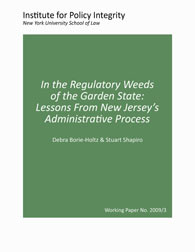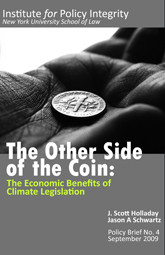-
EPA analysis of Kerry-Lieberman only offers half the picture
The EPA’s economic analysis of the climate bill in the Senate came out today and unfortunately reveals only half the picture. It looks only at the costs that the bill would impose (described as modest) but does not at all address the benefits.
-
Public Comments on White House Cost-Benefit Proposal
Policy Integrity submitted comments today on proposed changes to the White House Council on Environmental Quality (“CEQ”) Principles and Standards for Water and Land Related Resources Implementation Studies. The proposal was released on December 9, 2009 and today marks the deadline for comments.
-
OMB responds to Policy Integrity comments
Each year, the Office of Management and Budget reports to Congress on the benefits and costs of federal regulations. Policy Integrity’s faculty advisor, Dean Richard Revesz and executive director, Michael Livermore were asked to serve as peer reviewers of the 2009 report, released today.
-
NY State Energy Plan released
New York State released its final Energy Plan today. Few changes were made from the revised draft version from the draft version. Policy Integrity had proposed distributing tradable energy vouchers to businesses instead of pure electricity subsidies in order to incentivize them to reduce their electricity usage—at no extra cost to taxpayers.
-
Expanded comments on the New York State Energy Plan
Policy Integrity expanded on our initial comments on the New York State Energy Plan. In this version, more detail is offered on how the state could build efficiency incentives into its economic development programs.
-
Letter to the Administration re: monetary calculations for the social cost of carbon
In the summer of 2009, the Department of Energy released a regulation to update electricity efficiency standards for vending machines. Though the rule itself was somewhat routine, it contained information that could have major effects on environmental regulation in the future.
-
Amicus brief against hazardous trucking regulations
In November 2008, the Bush Administration finalized a regulation allowing truck drivers to spend more hours behind the wheel. To counter the deregulation, advocacy groups including Public Citizen filed suit against the Federal Motor Carrier and Safety Administration (part of the Department of Transportation) in March 2009.
-

In the Regulatory Weeds of the Garden State
Lessons From New Jersey’s Administrative Process
There is a dearth of studies about the effects of the proceduralization of the rulemaking process on state regulations. In the Regulatory Weeds of the Garden State focuses on regulations promulgated in New Jersey, both prior to and following major procedural changes enacted in the state in 2001.
-

The Other Side of the Coin
The Economic Benefits of Climate Legislation
This brief compiles estimates from several different federal agencies, and calculates that the economic benefits of the emissions cap in the Waxman-Markey bill likely dwarf the costs by as much as 9-to-1 or more. The benefit to cost ratio was determined using the EPA’s previously released (and peer reviewed) cost estimates and a newly released “social cost of carbon” estimate from an interagency process which provides a conservative dollar figure for the benefits of greenhouse gas reductions.
-
Changes to EPA’s Cost-Benefit Guidelines
EPA has been quietly working on some serious changes to the guidelines it uses to conduct cost-benefit analysis. Tweaks to the powerful but low-profile Guidelines for Preparing Economic Analyses could have major impacts on the environment. The Guidelines is little known outside of the agency, but is used in the design of every major environmental regulation.
Viewing recent projects in Government Transparency
